(This post contains affiliate links. If you purchase a course through these links, I may earn a small commission — at no extra cost to you. Rest assured, this does not influence my reviews.)

Before we dive into this Udacity review, here’s a quick announcement: Udacity is currently offering 40% off all Nanodegree programs, plus additional personalized discounts. If you’re planning to enroll in any Nanodegree, now is a great time to save big—just make sure to read our full review first.
If you’ve ever checked Udacity’s pricing or the cost of its Nanodegree programs, you know they’re not exactly budget-friendly.
But the real question is—are Nanodegree programs worth it? Do they provide the knowledge and training you need to grow your career and land a job?
If you’re considering enrolling in a Nanodegree program, you’re in the right place.
Based on my personal experience and feedback from other Nanodegree graduates, I’ll walk you through everything you need to know about this platform—so you can decide whether to go for a Nanodegree or explore other alternatives.
For those in a hurry or looking for a TL;DR, here’s my Udacity verdict:
Udacity is a top-tier e-learning platform for anyone serious about building or advancing a career in tech. Its Nanodegree programs are created in collaboration with industry leaders like Google, AWS, and Microsoft, offering project-based learning, mentorship, and career support that many other platforms can’t match.
That said, Udacity is not cheap—and a Nanodegree alone won’t guarantee you a job. While most programs deliver strong training and real-world value, a few fall short and aren’t worth the high price tag.
Here are the Udacity programs I’ve reviewed positively and consider worth the investment:
- Data Analyst Nanodegree Program
- Deep Learning Nanodegree Program
- AWS Machine Learning Engineer Nanodegree
- AI Product Manager Nanodegree Program
- Self-Driving Car Engineer Nanodegree
- UX Design Nanodegree Program
- Front-End Web Developer Nanodegree Program
- Digital Marketing Nanodegree Program
These programs offer high-quality training and feel worth the cost—especially with Udacity’s evergreen 40% discount.
Now, let’s dive into the complete review of Udacity…
What is Udacity?
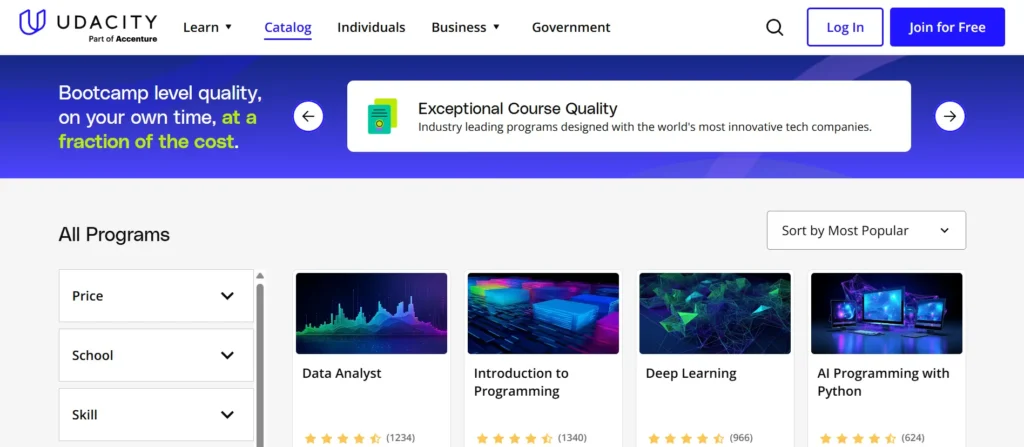
Udacity is an online learning platform that allows you to develop new skills from the comfort of your home. Whether you want to advance in your career, upgrade your workplace skills, or explore cutting-edge technologies, Udacity offers programs tailored to industry needs.
Founded in June 2011 by Sebastian Thrun, David Stevens, and Mike Sokolsky, Udacity now serves over 11.5 million learners worldwide. It offers around 500 courses focused exclusively on leading technology fields such as Artificial Intelligence, Cloud Computing, Data Science, and more.
Udacity collaborates with top companies like Microsoft, AWS, Google, and Intel to deliver high-quality, industry-relevant training.
Upon completing a program, learners receive a Nanodegree certificate that validates their expertise in a specific area (more on Nanodegrees later).
For individuals, Udacity offers 8 core program areas:
- Artificial Intelligence
- Autonomous Systems
- Business
- Cloud Computing
- Cybersecurity
- Data Science
- Product Management
- Programming & Development
Notably, fields like AI & Business Intelligence, Cybersecurity, and UX Design are among the top 5 most in-demand tech skills for jobs in 2025—areas where Udacity provides specialized programs.
Across these 8 program areas, Udacity offers 60+ Nanodegree programs covering topics such as Android Development, Digital Marketing, Cryptography, UX Design, Deep Learning, Game Development, and Machine Learning.
After completing any Nanodegree program, you’ll receive a Nanodegree Certificate—a credential we’ll explore later to see how it can impact your career.
What are Udacity Schools?
If you want to build a career in a specific field and explore all its related programs, you should check out Udacity Schools.
When you select a field, Udacity displays all the courses and Nanodegree programs available in that area. These “schools” are essentially structured learning paths designed to help you develop expertise from the ground up in a particular domain.
For example, choosing the School of Programming & Development will show you programs like:
- Front-End Web Developer
- Full Stack Web Developer
- Java Developer
- Cloud Developer
- Cloud DevOps Engineer
- C++
- Data Structures & Algorithms
- Data Engineer
- Introduction to Programming
You can enroll in any individual program, but following a school’s pathway helps you start with the fundamentals and progress through more advanced topics step by step.
Similarly, if you’re interested in Cybersecurity, the School of Cybersecurity includes programs like Security Engineer, Ethical Hacker, and Data Privacy—covering the field from multiple angles.
In total, Udacity has 8 schools, each representing a major program area. Depending on your interests, you can explore and specialize in the one that aligns with your career goals.
What is a Nanodegree Program?
Udacity is best known for its industry-focused tech programs called Nanodegrees. A Nanodegree typically consists of 3–4 courses and takes several months to complete. Currently, Udacity offers 80+ Nanodegree programs across various tech domains.
Pricing starts at $249/month (about ₹17,911 per month) and you pay for as long as it takes you to finish the program. Later, I’ll share tips on how to save money on a Nanodegree.
Upon completion, you’ll receive a Nanodegree certificate.
Note: Udacity’s Nanodegree certificates are recognized by leading tech companies such as Google, Amazon, and Facebook. However, they are not accredited by traditional educational institutions—they are issued solely by Udacity.
You might be asking: If it’s not accredited, what’s the real value of a Nanodegree?
What’s the Value of a Nanodegree Program?
- Gain in-demand skills & expertise in a specific field.
- Access to student community & technical mentor support throughout your learning journey.
- Industry-backed curriculum, built with companies like Google, Facebook, Amazon, Salesforce, and GitHub.
- Career services, including resume reviews, GitHub portfolio feedback, and LinkedIn profile optimization.
- Employer interest—many top tech companies actively hire Nanodegree graduates.
While these benefits make Nanodegrees appealing, it’s worth noting that no program is perfect—Udacity has its pros and cons, which we’ll explore later.
Next, let’s see whether a Nanodegree can actually help you land a job.
Can You Get a Job with a Nanodegree Certificate?
Nanodegree programs are excellent for enhancing your skills or switching to a new career path—but a Nanodegree certificate alone is unlikely to land you your dream job.
Employers consider multiple factors before hiring: your hard skills, soft skills, academic background, and overall work experience. If you already have an academic degree, a Nanodegree can serve as a strong boost to accelerate your career growth.
Udacity also includes career support services with its Nanodegree programs, such as:
- LinkedIn profile optimization
- Resume review and feedback
- GitHub portfolio guidance
In short, a Nanodegree won’t guarantee you a job, but it can significantly increase your chances—especially if paired with strong technical abilities and real-world project work.
Remember, certificates and degrees matter, but knowledge and skills matter more. Many top companies today prioritize what you can do over the titles you hold.
How Is My Udacity Experience?
If I had to sum it up in one word, I’d say fruitful—but not without its flaws. I’m speaking from personal experience with the courses I’ve taken.
Before reviewing any learning platform and evaluating its content quality, I always enroll in a few courses, research deeply, and then share my honest opinion.
From the start, Udacity has been well-known for its high-quality content in tech fields. One key reason is that every Nanodegree program is developed in collaboration with leading companies in the relevant industry.
For example, the Digital Marketing Nanodegree I pursued was created with input from Google, HubSpot, Mailchimp, Moz, and Facebook. Similarly, the Machine Learning Engineer for Microsoft Azure program was developed in partnership with Microsoft.
Another strong point is Udacity’s instructors and mentors—they’re highly qualified and actively working in the fields they teach. In my Digital Marketing program, many instructors were seasoned Digital Marketing Professionals and Managers.
After completing a Nanodegree, Udacity also offers career services, such as resume support, LinkedIn profile optimization, and more (as I’ve mentioned before). The courses include real-world projects, project reviews, and personalized feedback from experienced reviewers.
However, my research also uncovered mixed feedback. Some students were dissatisfied with Udacity’s AI and Deep Learning Nanodegree programs. Others mentioned that a portion of students managed to graduate by simply copying and pasting code from GitHub.
On the other hand, Udacity’s Programming and Data Analyst Nanodegree programs received a lot of praise. The biggest concern for most students was the price—and it’s true, Nanodegree programs are on the expensive side and not easily affordable.
Udacity’s Free Courses:
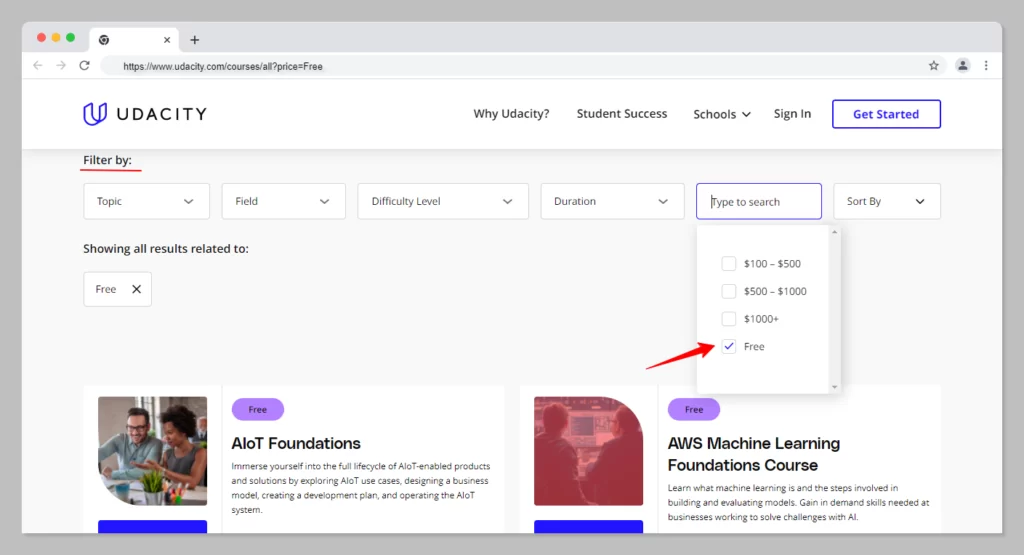
If you’re looking for some free courses on Udacity just to start your learning or for any other reason then Udacity offers you 200 free courses.
These free courses are enough to gain some fundamentals and necessary skills in any tech field but you can’t expect to get any certificate or any support with it. These free courses can also fulfill the prerequisites that you get asked for before enrolling in any Nanodegree program.
Some of Udacity’s free courses can also access on Udacity’s official YouTube channel. Let me show you a few best free courses…
Udacity’s best free courses:
- AWS Machine Learning Foundations: This is a beginner-level course that gives you the necessary skills to learn Machine Learning. In this free course, you learn Machine Learning Algorithms, best practices, and AWS AI tools, like Amazon SageMaker and more.
- Intro to Python Programming: If you want to learn to code and have no idea where to start, this course is made for you where you learn python and coding at a beginner level. This free course covers all the fundamentals you need before diving into the Data Analyst Nanodegree.
- Developing Android Apps with Kotlin: If you want to learn how to develop an Android app as a mobile developer with tools such as Room, Work Manager, and more then you can join this free course. This course will lead you to the Android Developer Nanodegree program.
- Intro to Data Structures and Algorithms: This course covers an in-depth look into common data structures and algorithms in Python. This course is the best way to establish a solid foundation before beginning the Introduction to Programming Nanodegree.
As you can see, Udacity’s free courses are aimed to give you the basic skills that you really need when you pursue a Nanodegree program. You can access any free course on Udacity without paying a single penny.
Does Udacity offer any free trial?
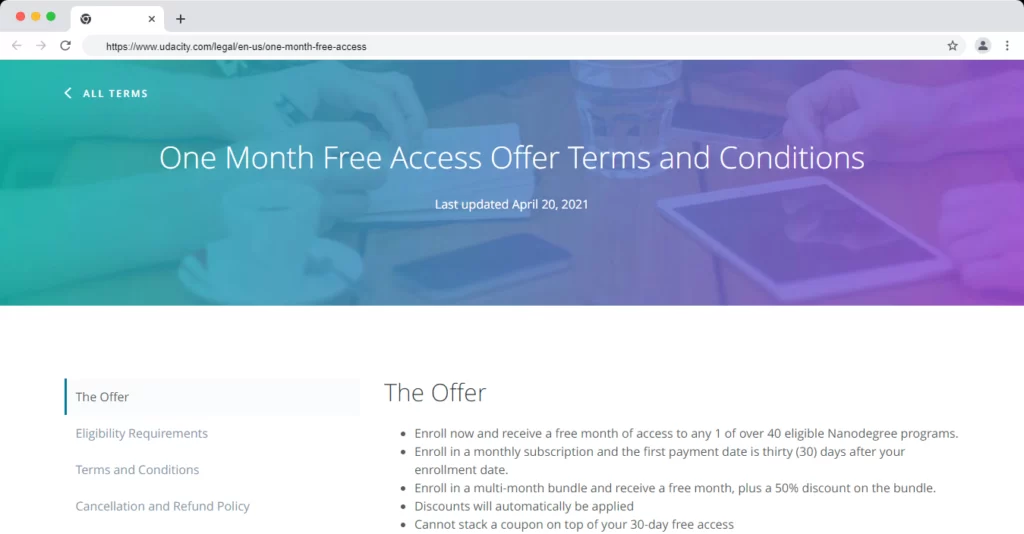
Well, Udacity used to offer a free trial but now it’s once in a blue moon. In addition to that, It had certain requirements and many terms and conditions to be eligible for a free trial. In my opinion, It’s not worth it.
Even at the present time, there is no free trial available on Udacity. The best you can get is the Nanodegree Referral Promotion. However, you may check the Current Promotions and Trials page at Udacity or sign up for the Udacity Newsletter to get notified about free trials and other Udacity offers.
You can check out all the FAQs and terms & conditions for the free trial.
Scholarships at Udacity
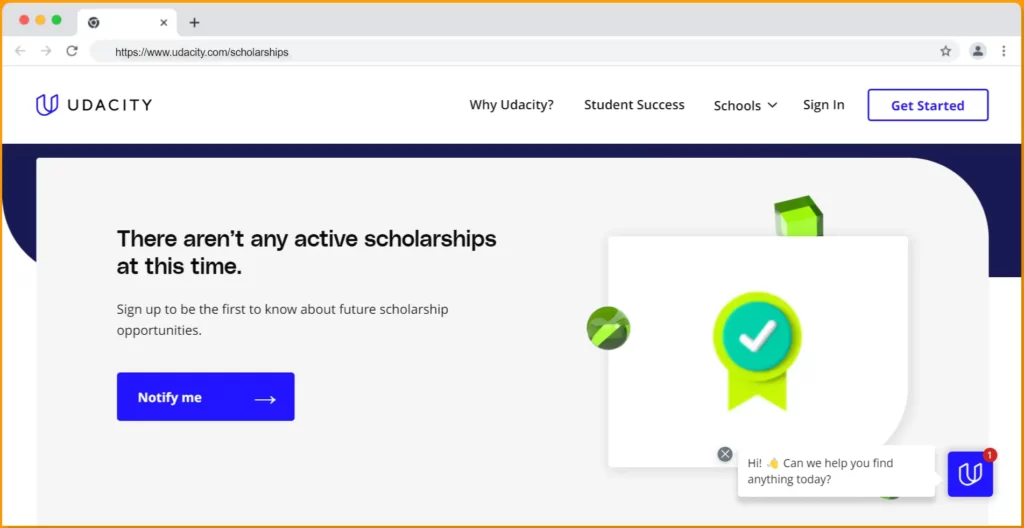
Udacity has tough prices for its courses and if you can’t afford it then you may be eligible of a scholarship at Udacity. However, these scholarships opportunity comes in a blue moon.
Its Scholarships are sponsored by top companies like Google, Microsoft, AT&T, and more for the definite time being. Different companies offer different kinds of scholarships with a specific number of students and Nanodegree programs.
But, I must tell you similar to a free trial, scholarships are not easy to get at Udacity. Some scholarships can be also based on a particular region which means students from that region would be only eligible to apply.
To participate in a scholarship program, you will be required to fill up an application. You can check out Udacity scholarship programs.
How good Udacity support is?
As I said, Udacity is trusted and partnered with top companies like Microsoft, AWS, Google, Intel, and more so it’s obvious that Udacity has a good support system for its users.
Let’s discuss more about it…
Udacity provides two types of supports-one is customer support to get some help and one for learners support who have enrolled in its programs or courses.
If you want to contact or need any help then Udacity has its chatbot, FAQs, and Contact page. You can also ask and submit your question directly at Udacity in form of a message.
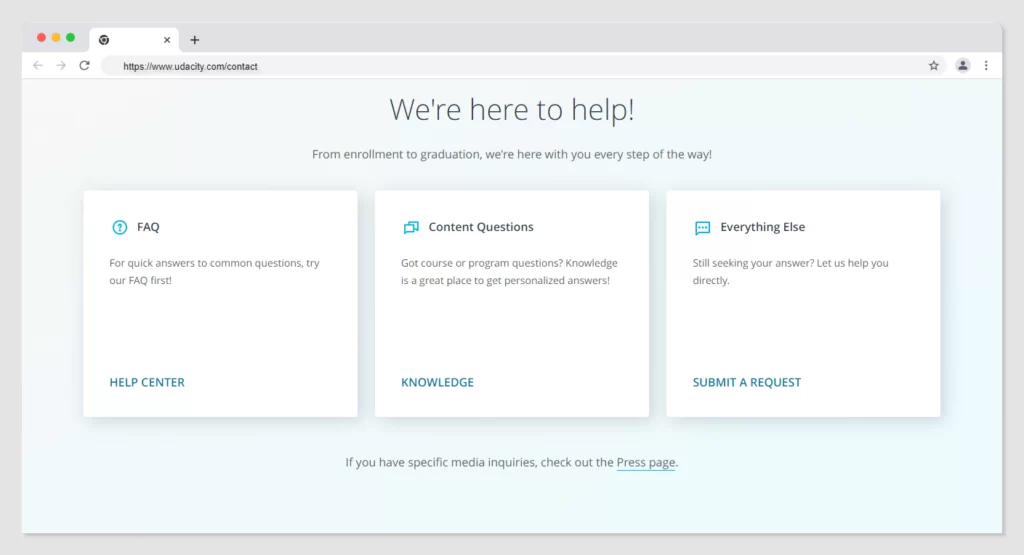
However, if you pursue any Udacity Nanodegree programs or courses then you get Technical mentor support, Student community, and Career support like resume support, Github review, and Linkedin profile optimization that helps you to land a job that you always dream of.
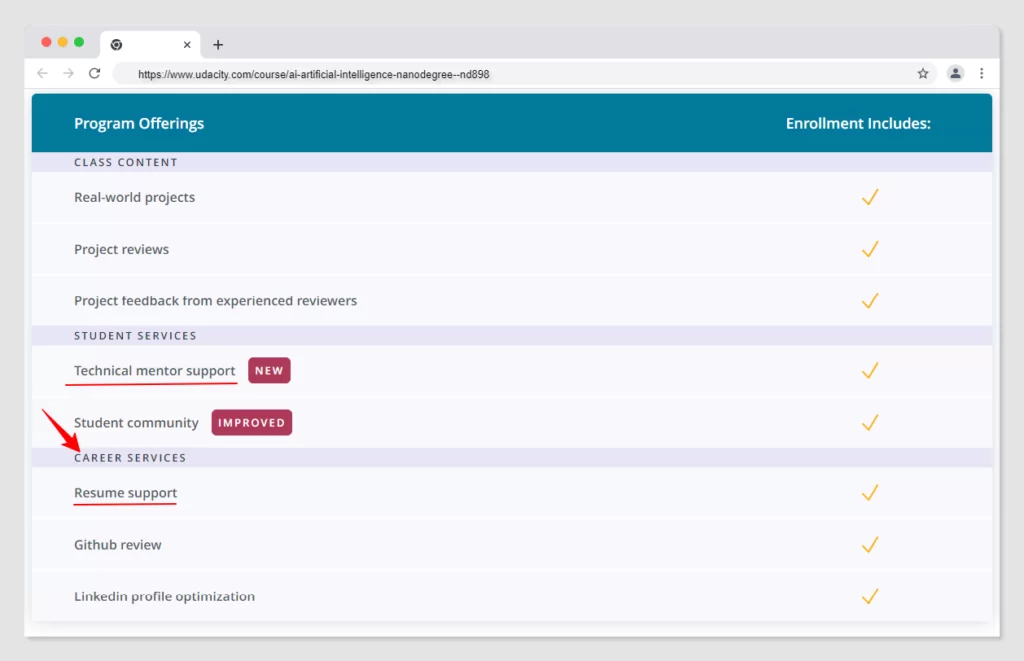
Alternatives of Udacity:
Udacity is not the only online learning platform available today, there are many more platforms that you should definitely check out before taking any Udacity courses.
The main competitors of Udacity are Coursera, Udemy, edX, LinkedIn Learning, and Pluralsight Skills.
Even recently, we published an article on Udacity vs. Coursera vs. Udemy guide where I shared which one would be better for your learning.
These alternative platforms have a wide range of subjects and courses whereas Udacity focuses only on the leading tech field which makes it completely different and holds a great identity.
Coursera is a platform where you can pursue online degree courses and professional certificate courses from recognized universities and top companies. And, edX and LinkedIn learning platform provides you certificates like Udacity’s Nanodegree platforms but have comparatively lower prices than Udacity. You may also read our Coursera Plus review which gives you access to thousands of courses including professional certification and specialization programs along with valid certificates.
Udemy’s best-selling and high-rated courses you can grab as cheap as INR 529 only with lifetime access that isn’t offered by Udacity.
If you’re on a tight budget and it’s difficult for you to afford Udacity programs then Coursera professional certificates courses or edX courses are worth checking out for you.
Now It’s your turn:
So, in this Udacity review, I shared all about Udacity including its pros and cons.
Now I’d like to hear from you: Got any thoughts or questions about Udacity? And, Did you satisfy with my Udacity review?
Let me know in the comment.
Udacity FAQs
Is Udacity good for learning?
Udacity Nanodegree shows that you have acquired enough skills in a field. It is true that Udacity Nanodegree can’t get you a job alone but a Nanodegree can upskill your in your career or, it would be great if you want to jump in a new career in a tech field.
Are Udacity courses recognised?
Udacity Courses and its programs are a built-in collaboration of top tech companies and industry experts. For example, its Digital Marketing Nanodegree program is built in collaboration with Google, Hubspot, Mailchimp, Moz, and Facebook.
How reliable is Udacity?
Udacity is trusted and partnered with top tech companies like Google, Microsoft, and many more. Even, Udacity courses and programs are built in collaboration with these top companies.
The instructors or mentors who teach at Udacity, have been already worked or working in a field that you want to join.
Yeah! It’s true that Nanodegrees are not recognized or accredited by educational institutions, it is issued by Udacity itself. But, the recognition of Udacity’s Nanodegrees comes from tech companies such as Google, Amazon, and Facebook.


Thanks for this article. Very instructive and I had some questions in my mind but now they are cleared.
Amazing Blog. thank you for sharing this information.
Glad you liked it…